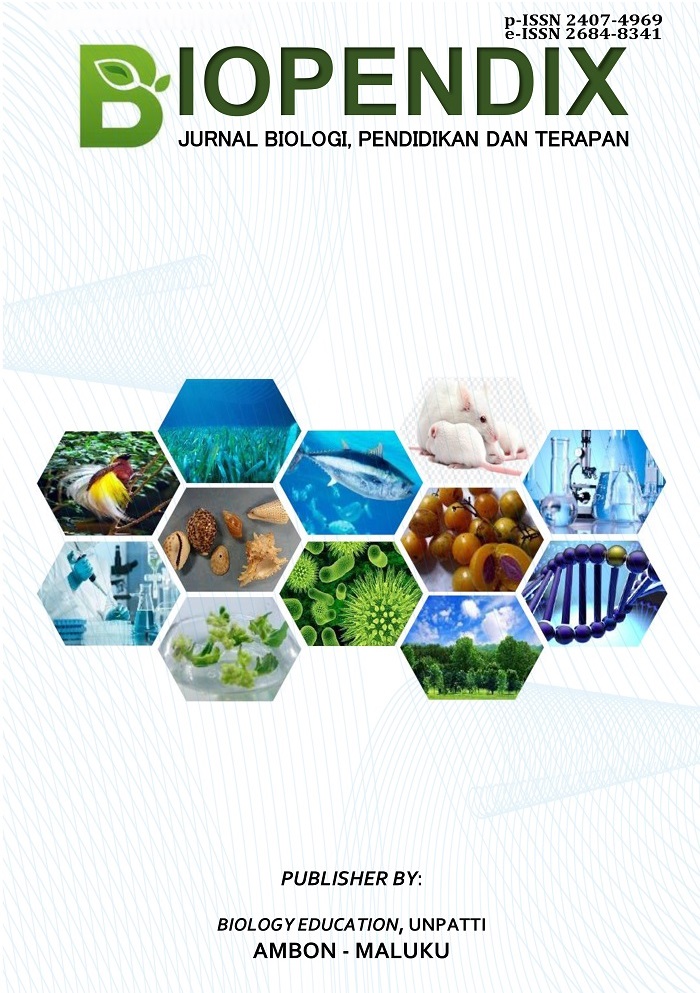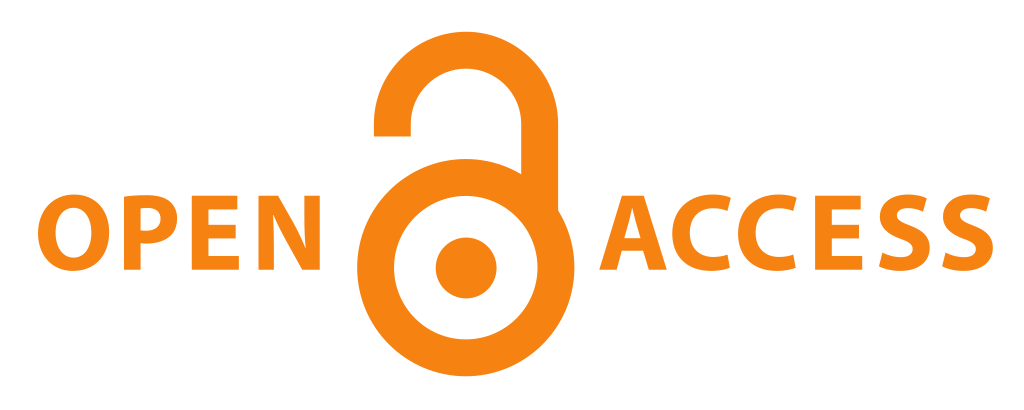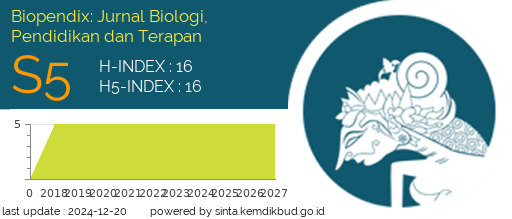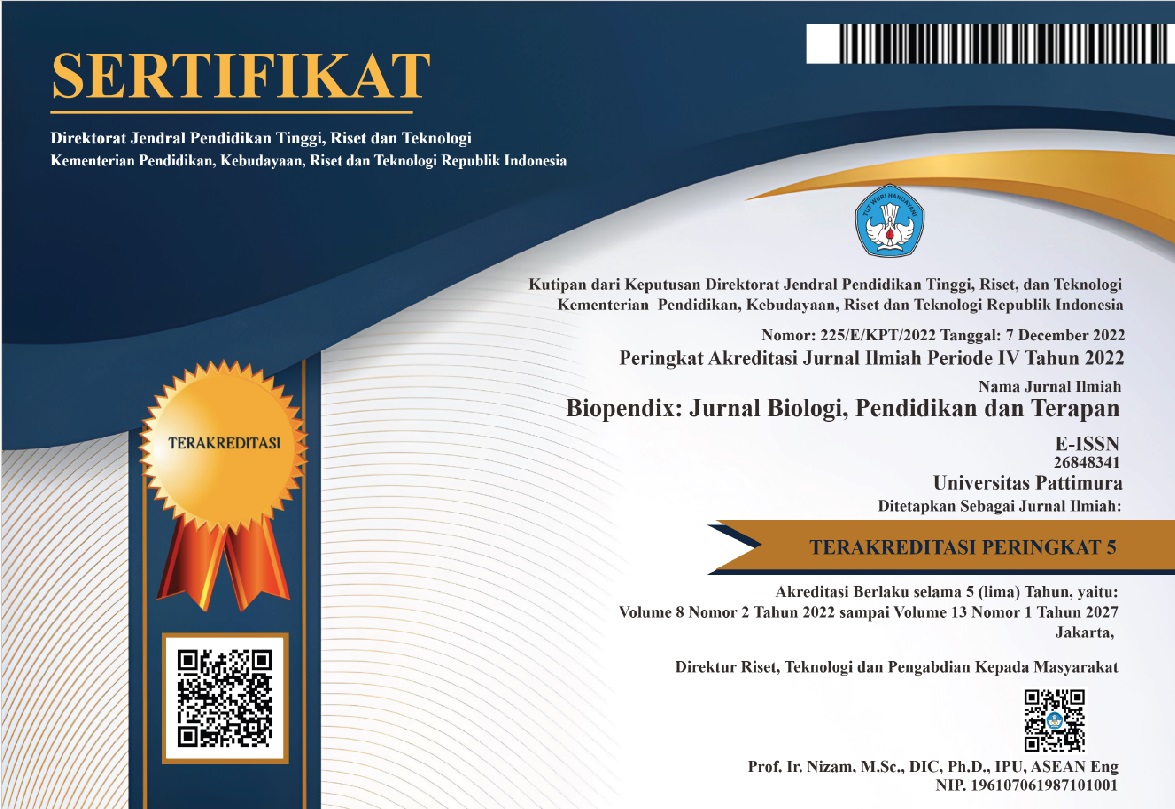Exploring the Integration of TPACK in Post-Pandemic Biology Education: A Study of Teachers in Magelang City
Abstract
This research aims to explore deeper into the perspectives of biology teachers in the Magelang city regarding the crucial of TPACK in post-pandemic learning to support the professional development of teachers and create more relevant and high-quality learning. The method applied in this research is qualitative interviews. The respondents in this study consisted of 9 biology teachers in Magelang city. The TPACK framework is essential for effectively integrating technology, pedagogy, and content, though challenges remain in selecting appropriate tools and ensuring student engagement. The COVID-19 pandemic accelerated technology adoption, and teachers emphasized the need for continuous training and support to improve technology integration. Overall, with adequate resources and training, technology can greatly transform biology learning.
Downloads
References
Agustriana, N., Kurniah, N., Alexon, A., Kusumah, R. G. T., & Adiarti, W. (2022). Edutainment Method Learning: Exploration of Variables and Implications on Children’s Social Skills. Al-Athfal: Jurnal Pendidikan Anak, 8(1), 27–38. https://doi.org/10.14421/al-athfal.2022.81-03
Bueno, R., Niess, M. L., Aldemir Engin, R., Ballejo, C. C., & Lieban, D. (2023). Technological pedagogical content knowledge: Exploring new perspectives. Australasian Journal of Educational Technology, 88–105. https://doi.org/10.14742/ajet.7970
Chen, M., Chai, C., & Jong, M. S.-Y. (2023). Actualization of teaching conceptions in lesson design: How teaching conceptions shape TPACK regarding spherical video-based virtual reality-supported writing instruction. Educational Technology Research and Development, 71(6), 2321– 2344.https://doi.org/10.1007/s11423-023-10295-0
David, L., & Weinstein, N. (2024). Using technology to make learning fun: Technology use is best made fun and challenging to optimize intrinsic motivation and engagement. European Journal of Psychology of Education, 39(2), 1441–1463. https://doi.org/10.1007/s10212-023-00734-0
García-Martínez, I., Tadeu, P., Montenegro-Rueda, M., & Fernández-Batanero, J. M. (2022). Networking for online teacher collaboration. Interactive Learning Environments, 30(9), 1736 - 1750. https://doi.org/10.1080/10494820.2020.1764057
Gozali, I. (2022). Studentsʼ Perspective on the Importance of EFL Teachersʼ TPACK (Technological Pedagogical Content Knowledge) and XK (Contextual Knowledge) for learning English during the Pandemic. PASAA, 64(1), 244–277. https://doi.org/10.58837/CHULA.PASAA.64.1.11
Khong, H., Celik, I., Le, T. T. T., Lai, V. T. T., Nguyen, A., & Bui, H. (2023). Examining teachers’ behavioural intention for online teaching after COVID-19 pandemic: A large-scale survey. Education and Information Technologies, 28(5), 5999–6026. https://doi.org/10.1007/s10639-022-11417-6
Mar’atussolichah, M., Ibda, H., Al Hakim, M. F., Faizah, F., Aniqoh, A., & Mahsun, M. (2024). Benkangen game: Digital media in elementary school Indonesian language. Journal of Education and Learning (EduLearn), 18(2), 480–488. https://doi.org/10.11591/edulearn.v18i2.21091
Maulana, I., Harahap, R. D., & Safitri, I. (2022). Use of learning media through technology for biology education students. BIO- INOVED : Jurnal Biologi Inovasi Pendidikan, 4(3), 282. https://doi.org/10.20527/bino.v4i3.13418
Muhazaroh, I. (2023). PEMANFAATAN MEDIA DIGITAL DALAM PEMBELAJARAN BIOLOGI DI ERA GLOBALISASI. Jurnal Penelitian Multidisiplin, 2(1), 153–157. https://doi.org/10.58705/jpm.v2i1.116
Ramaila, S., & Molwele, A. J. (2022). The Role of Technology Integration in the Development of 21st Century Skills and Competencies in Life Sciences Teaching and Learning. International Journal of Higher Education, 11(5), 9. https://doi.org/10.5430/ijhe.v11n5p9
Romano, M., Díaz, P., & Aedo, I. (2023). Empowering teachers to create augmented reality experiences: The effects on the educational experience. Interactive Learning Environments, 31(3), 1546–1563. https://doi.org/10.1080/10494820.2020.1851727
Roy, A. (2019). TECHNOLOGY IN TEACHING AND LEARNING. International Journal for Innovation Education and Research, 7(4), 414–422. https://doi.org/10.31686/ijier.vol7.iss4.1433
Saharuddin, M. H., Nasir, M. K. M., & Mahmud, M. S. (2025). Exploring Teachers’ Technological Pedagogical Content Knowledge in Utilising Artificial Intelligence (AI) for Teaching. International Journal of Learning, Teaching and Educational Research, 24(1), 136–151. https://doi.org/10.26803/ijlter.24.1.7
Sukarno, S., & Haryati, S. (2015). Developing a Model of Compulsory Basic Education Completion acceleration in Support of Millennium Development Goals in Magelang, Indonesia. International Education Studies, 8(7), p127. https://doi.org/10.5539/ies.v8n7p127
Theodorio, A. O., Waghid, Z., & Wambua, A. (2024). Technology integration in teacher education: Challenges and adaptations in the post- pandemic era. Discover Education, 3(1), 242. https://doi.org/10.1007/s44217-024-00341-1
Copyright (c) 2025 Muhammad Khoirul Antony, Sendy Putra Pradana, Ahmad Naharuddin Ramadhan, Susi Dewiyeti, Iful Amri

This work is licensed under a Creative Commons Attribution-ShareAlike 4.0 International License.
Authors who publish with this Journal agree to the following terms:
- Author retain copyright and grant the journal right of first publication with the work simultaneously licensed under a creative commons attribution license that allow others to share the work within an acknowledgement of the work’s authorship and initial publication of this journal.
- Authors are able to enter into separate, additional contractual arrangement for the non-exclusive distribution of the journal’s published version of the work (e.g. acknowledgement of its initial publication in this journal).
- Authors are permitted and encouraged to post their work online (e.g. in institutional repositories or on their websites) prior to and during the submission process, as it can lead to productive exchanges, as well as earlier and greater citation of published works





 2
2






